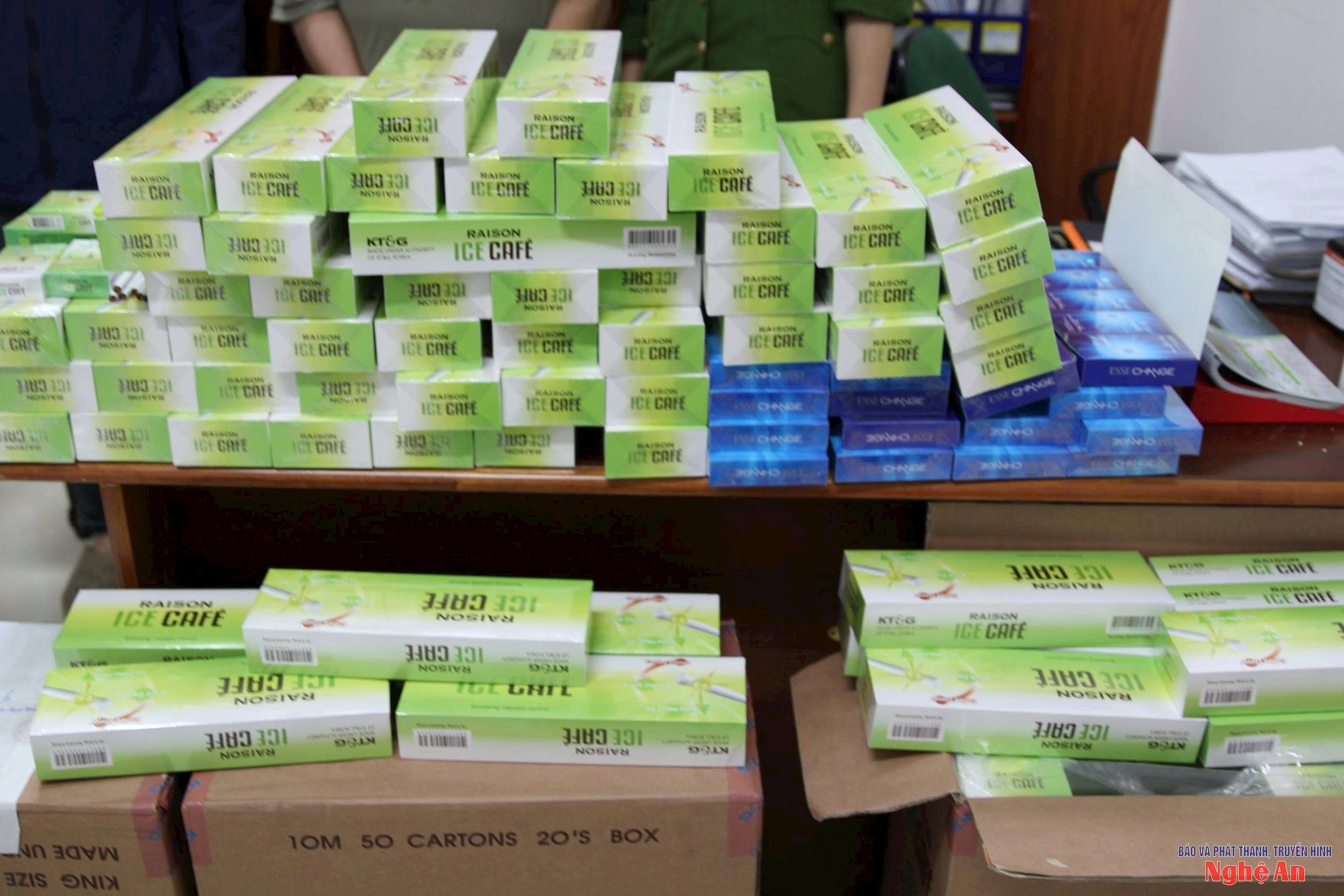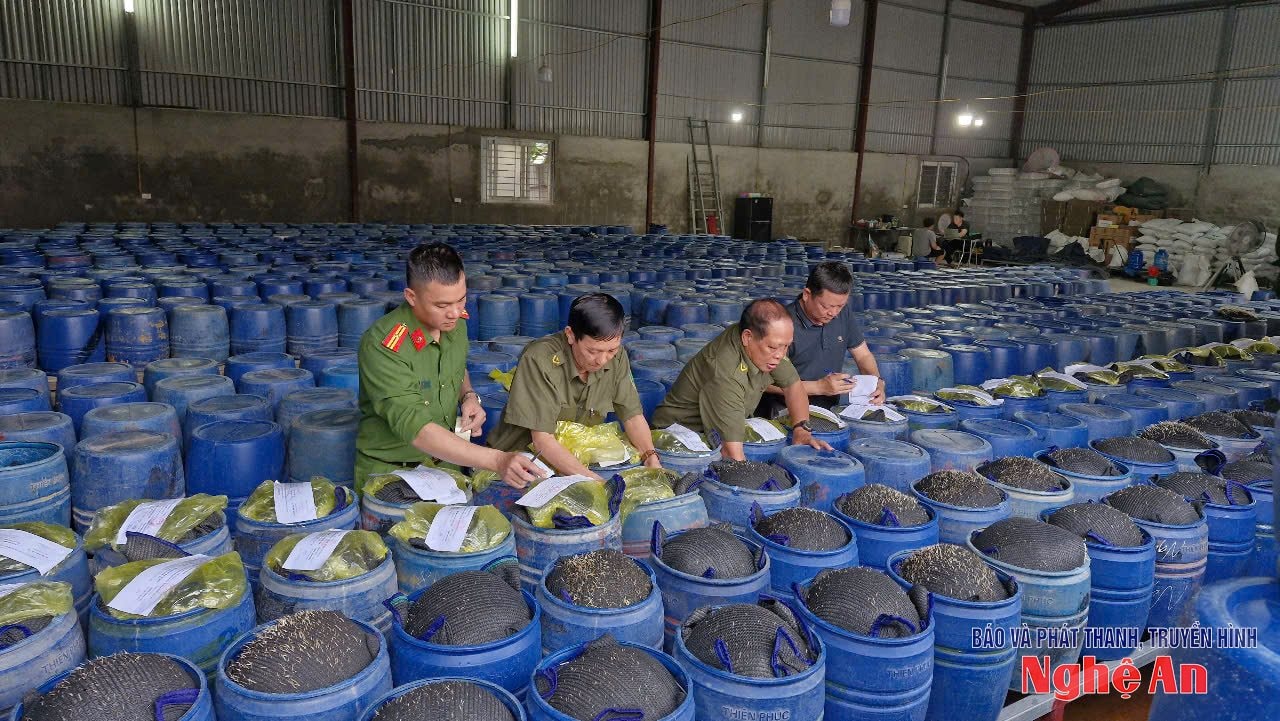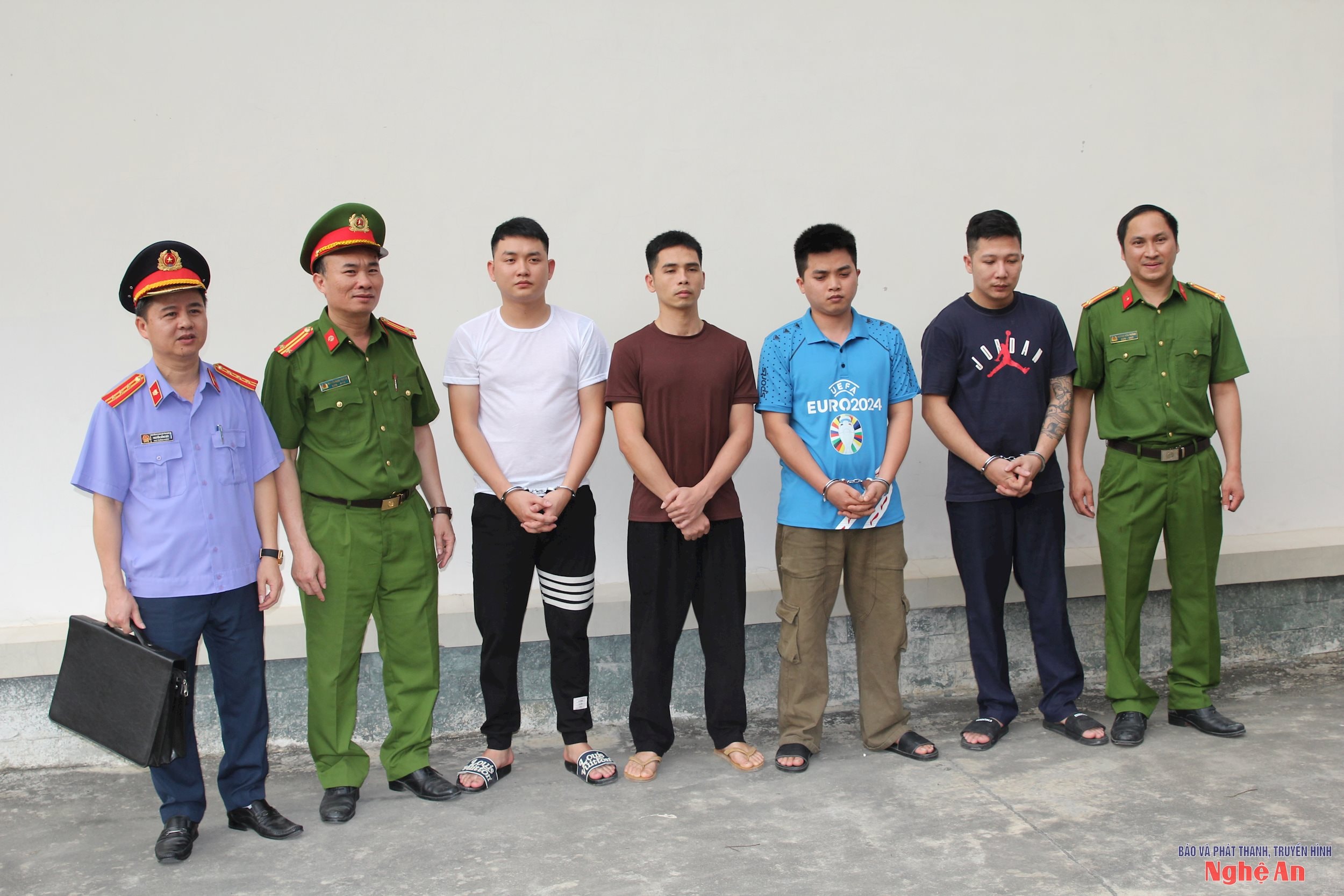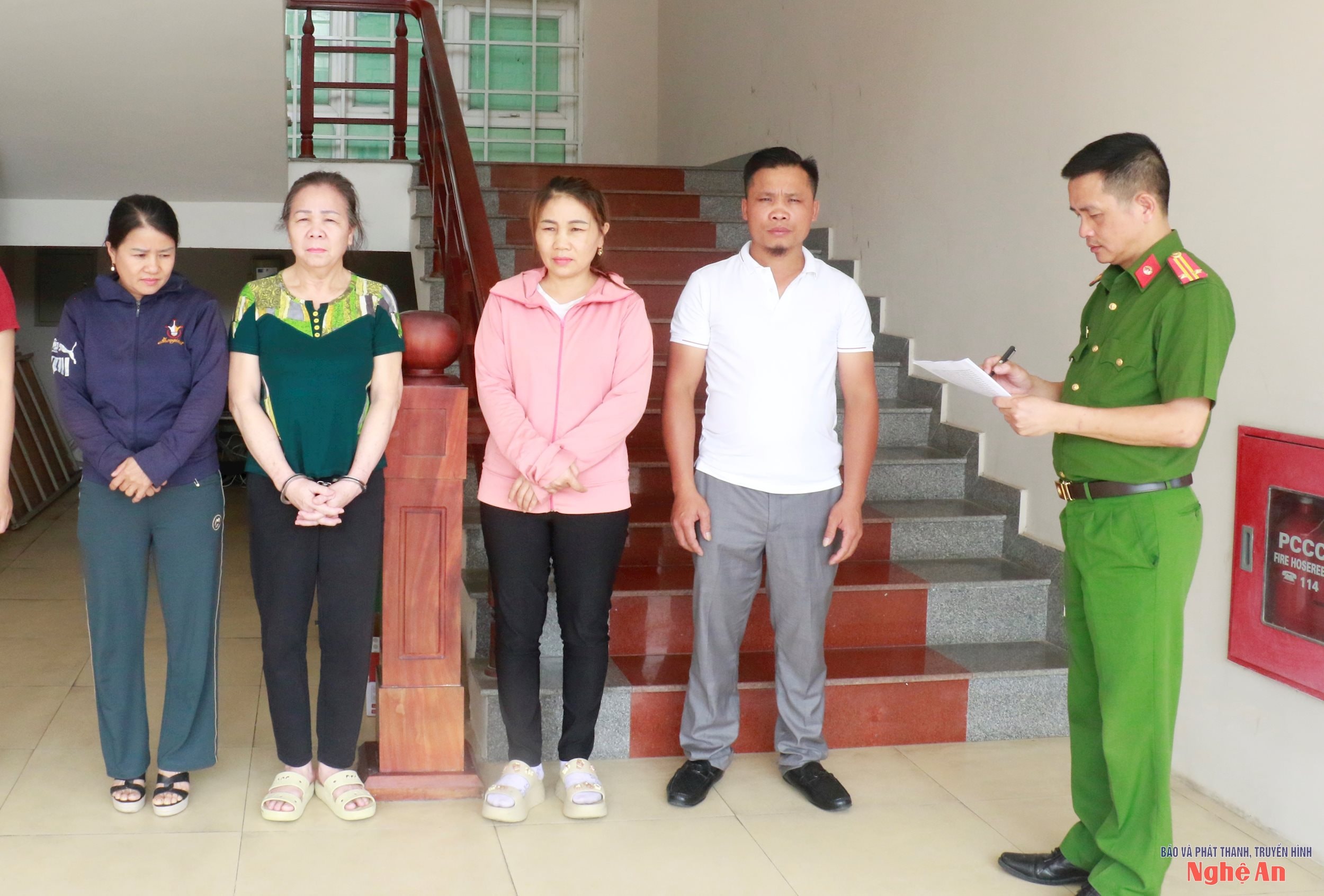Nghe An police have continuously discovered and handled many cases of counterfeit goods and dirty food, and will continue to conduct regular and surprise inspections.
Faced with the widespread situation of counterfeit, poor quality goods and dirty food, which are harmful to people's health and the business environment, Nghe An Provincial Police have resolutely taken action. Promoting the core role in State management of security and order, the police force has proactively grasped the situation, closely coordinated with functional agencies, synchronously deployed professional measures, and destroyed many networks and groups.
Many large-scale cases of counterfeit goods and dirty food trafficking were discovered.
At the end of May 2025, a large-scale inter-provincial counterfeit goods transportation and consumption ring was dismantled by the Department of Police Investigation of Economic Crimes, Corruption, Smuggling and Environment (Economic Police Department).
Specifically, through the process of investigation, monitoring, and coordination with Market Management Team No. 1 (Nghe An Market Management Department), the force inspected the truck with license plate 37C-441.xx driven by Nhu Van H. (born in 1994, residing in the old Quynh Luu district) and discovered nearly 480,000 products without invoices proving their origin. The exhibits included more than 400,000 fake shampoo packages of famous brands, 6,000 fake Comfort fabric softener packages, nearly 1,300 tubes of toothpaste and 63,000 pens. The total value of the shipment is estimated at about 523 million VND.
.jpg)
The driver confessed to transporting goods for Nguyen Thi Dung, Pham Thi Phuong and Hoang Van Thai (residing in Dien Kim, old Dien Chau). Searching the residence, the police seized thousands of more counterfeit products. During the investigation, it was determined that Pham Thi Sang (born in 1962, residing in Gia Lam, Hanoi) was the mastermind, specializing in collecting counterfeit goods from the Northern hubs and then distributing them to Dung, Phuong and Thai for consumption in the Central region, especially in remote areas. The police have initiated a case and prosecuted 4 suspects for "trading in counterfeit goods".

Recently, on July 3, the Economic Police Department broke up a case, caught Pham Ha Vinh (born in 1993, residing at 82 Bui Huy Bich Street, Vinh Loc Ward) red-handed for the act of "Trading in prohibited goods", confiscating 2,640 packs of smuggled cigarettes of various types. Currently, the Investigation Police Department of Nghe An Province Police is expanding the investigation and handling the case according to the provisions of law.

Not only fighting against counterfeiting crimes, Nghe An Provincial Police also resolutely took action in handling cases related to dirty food, a serious threat to public health. One of the typical recent cases is the special project to fight against dirty food production in the old Vinh City.
On April 11, 2025, the Economic Police Department presided over and coordinated with relevant units to simultaneously inspect 4 bean sprout production facilities in the old Vinh City, catching 4 subjects red-handed, including: Luu Manh Huong (born in 1993), Luu Van Trung (born in 1997), both residing in Truc Ninh District, Nam Dinh Province (now Ninh Binh Province); Tran Khac Duy (born in 1990) and Nguyen Van Huong (born in 1998), both residing in Vinh Tan Ward, Vinh City (now Truong Vinh Ward).
At the scene, the authorities seized nearly 2,000 jars of bean sprouts with a total weight of about 25 tons, 25 liters of "candy water" chemical (scientific name is 6-Benzylaminopurine - 6-BAP), 150 liters of mixed chemical solution and many related exhibits. This is a type of chemical banned from use in food production and processing because it can cause acute poisoning, digestive disorders, damage to the lungs and respiratory system if humans come into contact or eat it.
The results of the extended investigation showed that from 2024 until the time of arrest, the subjects had produced and sold to the market about 3,500 tons of finished bean sprouts using "candy water" to promote growth, create an eye-catching appearance and sell for high profits. Based on the collected documents, on April 15, the Investigation Agency issued a decision to prosecute 3 cases, prosecute the accused and execute the order to temporarily detain the above 4 subjects for the crime of "Violating regulations on food safety".
According to statistics, in the first 5 months of 2025, the Provincial Police discovered and arrested 894 cases of 1,071 subjects violating the law on banned goods, counterfeit goods, intellectual property infringement, and food safety; seized many exhibits and goods worth about 18 billion VND; prosecuted 160 cases/224 subjects related to acts of banned goods, smuggling, trade fraud, counterfeit goods, and food safety; and at the same time, administratively sanctioned over 600 cases, collecting more than 9.2 billion VND for the budget.
During the peak period (from May 15, 2025 to June 15, 2025), Nghe An Provincial Police directly detected and arrested 78 cases, 80 subjects (including 3 organizations, 75 individuals), prosecuted 3 cases, 4 subjects "violating food safety regulations".
Tighten management and strictly handle violations
As a locality with a large area, large population, high consumption demand and vibrant trade, Nghe An has become the destination of many goods from provinces and cities across the country. However, this is also an opportunity for subjects to take advantage of mixing fake, counterfeit, poor quality goods, goods of unknown origin to make illegal profits.
Recently, along with the rapid development of e-commerce, the situation of illegal goods trading on digital platforms has become increasingly complicated. Many organizations and individuals have used social networks such as Facebook, TikTok, created closed groups on Zalo or set up sales websites to promote and sell fake and poor quality goods. Common tricks are not publicizing warehouse addresses, frequently changing locations, renting warehouses in deserted places to avoid detection; even not having an actual warehouse but only importing goods when there is an order, or acting as an intermediary to enjoy the difference between the seller and the buyer.
Post-discovery processing also faces many difficulties. Facilities for preserving exhibits, especially perishable goods such as food, are limited; some types of goods still pose a risk of fire, explosion, and toxicity.

Faced with that reality, Nghe An Police have clearly identified the core role in State management of preventing and combating smuggling, trade fraud and counterfeit goods. With the motto "no forbidden zones, no exceptions", the police force has strengthened inspection, supervision and strictly handled violations, especially goods that directly affect the health of consumers such as milk, functional foods, medicines, cosmetics, alcohol, fresh food, etc.
The fight is focused on specific routes, areas, subjects and goods. Key routes include: National Highway 1A, National Highway 7, 48, the North-South railway, land border routes through Nam Can, Thanh Thuy, Tam Hop border gates, sea routes through Cua Lo port and the old coastal areas of Dien Chau and Quynh Luu. Key areas include wholesale markets, warehouses, large commodity flow centers and establishments that take advantage of e-commerce for illegal business.
Regarding the subjects, the police force focuses on checking and fighting against the networks, groups, and masterminds who specialize in supplying, transporting, and consuming fake goods, banned goods, and unsafe food. The key items include: processed foods, milk, functional foods, medicines, cosmetics, fireworks, cigarettes, fertilizers, pharmaceuticals, electronics, clothes, shoes, etc.

It is forecasted that in the coming time, when consumer demand increases sharply, import-export activities and e-commerce continue to expand, the situation of violations will become more complicated. Therefore, Nghe An Police continue to strictly implement the direction of the Ministry of Public Security, the Provincial People's Committee and the Provincial Steering Committee 389, strengthen coordination with relevant departments and branches to organize periodic and surprise inspections of production and business activities; promptly detect and strictly handle violations in accordance with the provisions of law.
In addition to professional work, the Provincial Police also stepped up coordination with press and media agencies to propagate; mobilize organizations and individuals not to assist in the trading, transporting, and consuming of smuggled goods, counterfeit goods, and goods of unknown origin. Business households were mobilized to sign a commitment to strictly comply with legal regulations, not to produce, trade, or store counterfeit goods, prohibited goods, poor quality goods, or goods that violate intellectual property rights. At the same time, they must post prices, sell at the right price, and post commitments at their business locations.
Nghe An police also called on people to actively denounce crimes and provide information related to commercial fraud, especially acts of taking advantage of digital platforms to violate the law. Thereby, contributing to building a safe and transparent consumer environment, protecting the legitimate rights of people and businesses.
